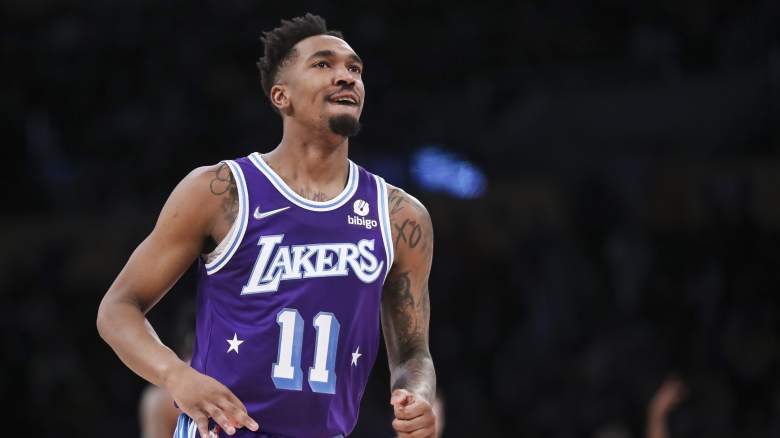
When you’re an NBA team in the Lakers’ situation, with an expensive and top-heavy roster, one of the dangers you might encounter is a player on a bargain deal outperforming what you’re paying him. It is a nice problem to have, at least until you start crunching the long-term numbers.
That is what is happening now with the way that guard Malik Monk is playing. He is helping to rescue the Lakers’ wayward season with his excellent perimeter shooting, but at the same time, he is playing so well that there’s little chance the team will be able to bring him back next season.
Let’s start with the good news. Monk is averaging a career-high 12.1 points this season, shooting 48.1% from the field and 39.7% from the 3-point line. Not only that, but in his last seven games, as the Lakers have committed to him as a starter, he is averaging a whopping 21.9 points on 56.3% shooting and 48.2% 3-point shooting.
If Monk can provide anything close to that kind of production going forward, he will go a long way toward resolving the Lakers’ issues with offensive spacing.
Now the bad news: Monk is on a one-year minimum deal worth $1.8 million. Under NBA rules, unless the Lakers were to clear out cap space, the most they would be able to pay Monk in the summer would be the taxpayer’s midlevel exception, as pointed out by Bleacher Report’s Eric Pincus.
When asked on Twitter about keeping Monk, Pincus pointed out that the Lakers’ offer would likely top out at one year and $6 million.
Malik Monk Will Seek Security in Next Contract
Coming on a night in which Monk scored a season-high 29 points and made seven 3-pointers, that’s a little distressing—Monk is playing like a guy destined for a bigger deal next summer.
Even if Monk were to only get a contract in the range of the non-taxpayer mid-level exception, he would still be looking at a deal that could run up to four years starting at $10 million. When the Lakers lost Alex Caruso to the Bulls, for example, he signed a four-year deal using the midlevel exception, though it was not the full exception—Caruso got $37 million.
Monk could be in line for that kind of contract. The Lakers would not be able to match it.
Clearly, that is what Monk wants. He turns 24 years old next month and has yet to have a big NBA payday. As Monk told The Athletic this week, “You always gotta bet on yourself, man.”
Longshot Ways the Lakers Could Keep Monk
It is possible that the Lakers could find a way to keep Monk, even if the chances are slim.
One way would be for Monk to sign the $6 million deal for one year next season, making him eligible for an Early Bird contract in 2023. That would almost require a handshake deal that would see the Lakers promising to take care of Monk with a bigger contract the following season, an arrangement upon which the league frowns.
Another problem: Monk would be looking for more immediate security, and $6 million with a promise of more is not much security. One way that could be more feasible, though, would be if Monk were to fall into a slump and make himself less attractive on the free agent market—he could fall into a slump down the stretch or in the playoffs that causes teams to shy away from an offseason pursuit.
Of course, if that happens, it hurts the Lakers this season.
The only other way to keep Monk would be for the Lakers to drop enough salary to get below the taxpayer line and have room to give Monk a midlevel deal. But with $140 million committed to just four players, that is pretty much impossible, unless the Lakers can dump Russell Westbrook and only get expiring salary in return.
Good luck on that.
As it stands, let’s appreciate what Monk is doing during this coming-out stretch with the Lakers. He has been remarkable and if he keeps up anything like this level he has been at, he could be a key cog in the Lakers putting together a long playoff run.
After that? Well, we may just have to wish him farewell.
Comments
Lakers Have Tough Free-Agent Future With Streaking Malik Monk: Analyst